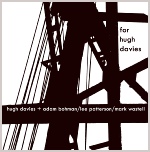Another Timbre TimHarrisonbre
An article about Another Timbre by John Eyles appeared in All About Jazz, May 2008.
Another Timbre is the newest label to appear on the UK scene. Its first batch of releases appeared in autumn 2007—to considerable acclaim—and its second batch in spring 2008. The music that Another Timbre releases is a fascinating blend of improv, eai [electro-acoustic improvisation] and modern composition, unlike that of any other current label.
The label is the brainchild of Simon Reynell who has worked in television for 25 years, mostly over the past 12 years as a documentary sound recordist. His decision to start the label resulted from a confluence of professional and personal factors. He was becoming increasingly disillusioned with TV in the UK, especially documentaries which he felt were being marginalised, sensationalised and dumbed-down; his work was no longer satisfying and he needed a new creative challenge. When he inherited £14,000 from an aunt, he started thinking. Around this time Reynell attended The Contest of Pleasures performance at the 2006 Huddersfield Contemporary Music Festival. He thought it was fantastic and asked John Butcher if anyone planned to release it; when Butcher said 'no,' Reynell saw his chance... That performance became Another Timbre's first release, Tempestuous, at01.
The diversity of the releases on Another Timbre clearly reflects Reynell's own taste in music, of which he says, “I've been a fan of contemporary music since my late teens (the early '70's). I first got into it through the classical end - Stockhausen, Nono, Berio, Cage, but soon discovered free improvisation, and as a student bought lots of Incus, Bead & FMP LP's (in those days students got grants). I was always more drawn to improvisation which, to my ears at least, connected more to contemporary classical music than free jazz, so Hugh Davies, Derek Bailey, AMM & the Gruppo di Nuova Consonanza were particular favourites. My interest in contemporary classical music has continued alongside my passion for improv, so I was very clear that I wanted Another Timbre to cover both areas. However I soon discovered that most classical music is prohibitively expensive to bring to disc, unless you have a wealthy patron or commercial backer. So whereas I'd really like a third of the releases to be classical, the reality will be a lot less.
“Within improv, I realise that I have been very lucky to be around at a time when a lot of excellent players are active, especially in the UK. I felt some sort of obligation to document a little of what was going on. I think that for me the deaths of Hugh Davies and Derek Bailey added a sense of urgency to this feeling. Inevitably Another Timbre's documentation will reflect my particular favourites, so expect repeated releases by the likes of Rhodri Davies John Butcher, Thomas Lehn, Matt Davis, Max Eastley, Chris Burn, Bechir Saade etc. Another Timbre improv releases will mostly be duos, trios & quartets. I don't want to do solos, as I like the sense of collaboration in small group improvisations. And I very rarely hear large group improvisations that I feel work very well. There are exceptions, of course, but don't expect many large group improv releases on Another Timbre.”
Of one release, Music for Shakuhachi, composed by Frank Denyer and played by Yoshikazu Iwamoto, Reynell is adamant that it not be considered World Music: “For me, the Denyer shakuhachi disc isn't World Music at all; he's just an exciting and under-appreciated contemporary composer who happens to use a lot of non-western instruments & timbres.” Nonetheless, An Account of my Hut—one of the latest batch of releases—consists of beguilingly beautiful chamber improvisations by Clive Bell and Bechir Saade, played on shakuhachi and ney; so it seems we can expect the label's releases to go some way beyond the conventional soundscapes of eai, improv and contemporary composition.
Reynell is not going to be partisan or factionalist in his choice of music for Another Timbre. He says, “One of the things I like about several of the above musicians is that their work as a whole straddles—and thereby renders problematic— the perceived division between eai and EFI [European Free Improv]. Though those two labels may make a certain sense in broadly descriptive terms, I like music on both sides of that perceived divide. I want Another Timbre's catalogue to pointedly avoid taking sides on the eai/EFI split. I love the music of several of the eai heroes, though others happen to leave me cold. Similarly I think there are 'old-style' improvisers who are stuck in a rut, but equally there are others who are probably assumed by eai's more passionate advocates to be stale & uninteresting, but who I think have a good deal to contribute. John Russell, Phil Minton & Evan Parker are examples of great musicians who can, if given the chance, produce really interesting collaborations with players more linked to eai.”
Reynell's sentiments are being demonstrated in practice by the releases on his label. One of the latest batch is a prime example. A Life Saved by a Spider and Two Doves features the combined talents of Max Eastley, Graham Halliwell, Evan Parker and Mark Wastell. Although Eastley and Parker may seem more EFI while the younger Halliwell and Wastell are more eai, the reality is more complex and interesting. To quote Reynell, the music “straddles—and thereby renders problematic—the perceived division.” Parker is more subdued than ever, adding twittering and prolonged drone-like tones, but decidedly not dominating proceedings. Sonically, he is an equal partner with the others; the whole ebbs and flows, creating a slowly evolving soundscape that has a foot in both camps. Unlike anything else you will have heard. Incidentally, the album title derives from medieval Japanese literature, as does that of the Bell-Saade release.
The third of the spring releases, Obdo, recorded live, pairs French pianist Frederic Blondy with Thomas Lehn's analogue synthesizer, the piano being routed via the synthesizer. Again, the music is more subdued and evolves more slowly than most improv but is more garrulous than eai, particularly during the title suite's not inconsiderable dramatic climaxes.
In common with all eight Another Timbre releases to date, it has the capacity to keep the listener guessing. To date, the label has eight releases and eight winners, none of them less than fascinating. Simon Reynell's future plans should continue this run: “A future development starting later this year will be a strand of limited edition CD-R's featuring less well-known musicians. Most of the CD's planned so far have at least one relatively well-known 'name.' But there is lots of excellent improv being made by musicians who aren't widely known. In the UK for instance there is a whole group of excellent young musicians who have emerged out of Eddie Prevost's improvisation workshop at Goldsmith's College. I would love to release discs by several of them, but this would be a fast road to bankruptcy. So later this year I'm going to start issuing CD-R's by lesser-known musicians. These can be issued very cheaply, especially if I do the recording & mastering myself. But it's imperative that these CD-R's aren't compromised in terms of musical quality; I want them to be just as strong as the CD catalogue.
“As to future CD releases, I'll just pick out the Hugh Davies tribute disc, which should be issued in July. It's a project that is particularly close to my heart. Rather than just issue some old recordings of Hugh's music, I decided to do something more contemporary. So three improvisers for whom Hugh was a major influence—Mark Wastell, Lee Patterson & Adam Bohman—improvise along to old recordings of Hugh playing solo. It was a risky idea, which could easily have gone wrong, but the results were extraordinary and all the musicians were delighted. I think it'll be a great CD.”
- John Eyles, All About Jazz
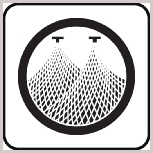
‘a life saved by a spider & two doves’
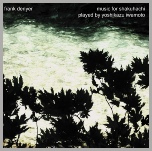
‘music for shakuhachi’
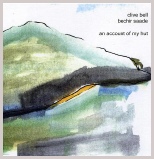
‘an account of my hut’
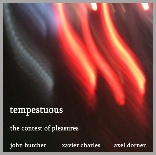
‘tempestuous’
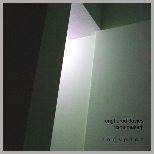
‘endspace’
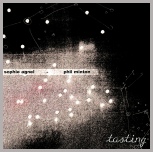
‘tasting’
‘for hugh davies’
